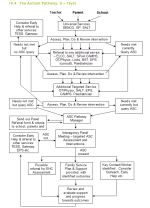Please note: This chapter describes the processes currently in operation. The Autism Pathway is under review and the new processes will be published here once agreed.
10.1 Introduction
This chapter sets out the systems we have in Wigan around the diagnosis of autism. It is important to note that when working with a child/young person who may have autism related difficulties or a diagnosis of autism, it is necessary to identify the primary need to establish which area of this file to work through. A diagnosis is not sufficient evidence to apply for an EHC Plan and it is therefore important to implement and evidence the relevant graduated response.
Please remember that education staff are not in a position to diagnose autism.
10.2 Definition
Autism is a lifelong developmental disability that affects how a person communicates with, and relates to, other people. It also affects how they make sense of the world around them.
It is a spectrum condition, which means that, while all people with autism share certain difficulties, their condition will affect them in different ways. Some people with autism are able to live relatively independent lives but others may have accompanying learning disabilities (external link) and need a lifetime of specialist support. People with autism may also experience over or under-sensitivity (external link) to sounds, touch, tastes, smells, light or colours.
More information can be found on The National Autistic Society website (external link).
10.3 Different signs of autism
Children and young people must have persistent deficits in the triad of impairments, social communication, social interaction and flexibility of thought, across multiple contexts and at different levels.
Social Communication Difficulties
- Lack of development of spoken language or a severe delay, with evidence from a specialist speech and language therapist
- Marked impairment in the ability to initiate or sustain a conversation with others
- Stereotyped or repetitive use of language.
Social Interaction Difficulties
- Lack of, or marked impairment, in the use of non-verbal behaviours during interactions, for example, eye contact, facial expression and gesture/body postures to regulate interactions
- Failure or limited development of peer relationships, appropriate to developmental level
- Does not spontaneously share enjoyment, interests and achievements with others
- Shows a lack of social and emotional reciprocity, ie. ‘give and take’.
Difficulties with Social Imagination and Flexible Thinking
- Shows a pre-occupation with one or more stereotyped interests, and has restricted patterns of interests, that are unusually intense or focused
- Shows an inflexible adherence to specific non-functional routines or rituals
- Shows stereotyped or repetitive motor mannerisms, for example, hand flapping, twisting or turning in circles, complex whole body movements
- Persistent pre-occupation with an object or part of an object.
Additional Features
- Over or under-sensitivity to light, sound, smell, taste, pain or noise
- Difficulty or disorder in early development, e.g. toilet training
- Difficulty with fine and/or gross motor skill development
- Advanced skill or ability in a specific aspect or area of the curriculum
- High level of cognitive ability but deficits in social skills.

10.4 The Autism Pathway: 5 – 19yrs
This webpage is currently under review. Please contact the Neurodevelopment team on 0300 707 1446 or alternatively email [email protected].
10.5 Referral to Autism Pathway Panel
This webpage is currently under review. Please contact the Neurodevelopment team on 0300 707 1446 or alternatively email [email protected].
10.6 The Autism Pathway Panel
This webpage is currently under review. Please contact the Neurodevelopment team on 0300 707 1446 or alternatively email [email protected].
10.7 Specific Assessment Tools, Interventions and Support
This webpage is currently under review. Please contact the Neurodevelopment team on 0300 707 1446 or alternatively email [email protected].
10.8 Training for Professionals and Parents
This webpage is currently under review. Please contact the Neurodevelopment team on 0300 707 1446 or alternatively email [email protected].